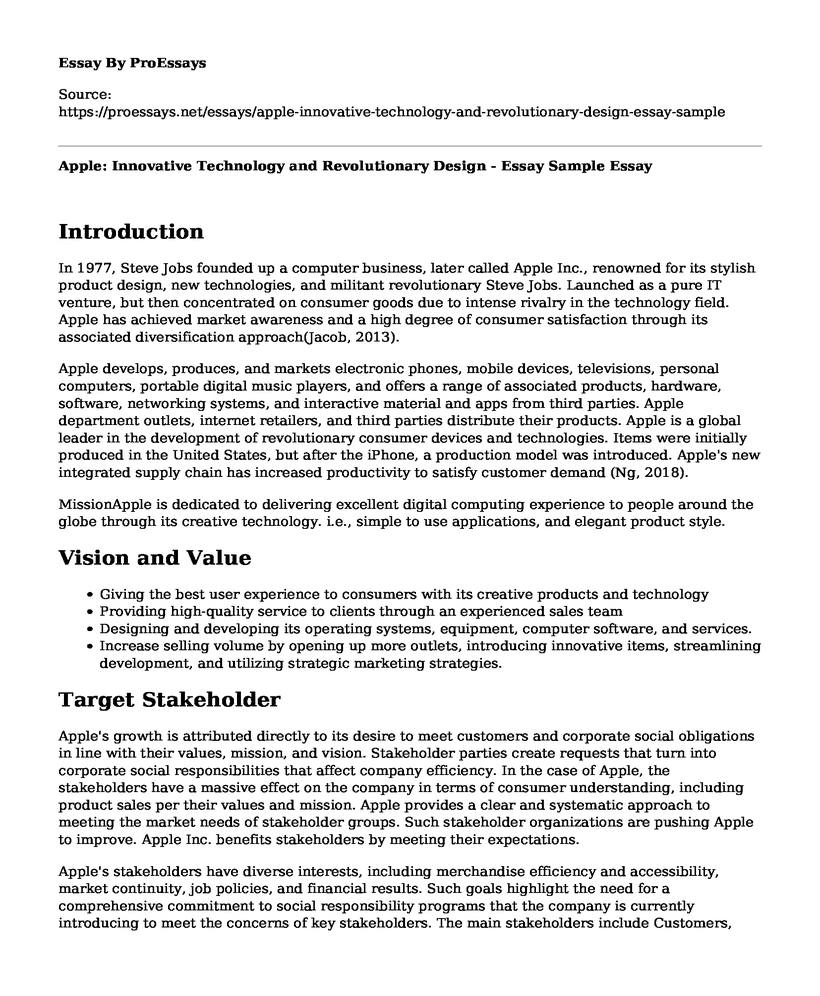Introduction
In 1977, Steve Jobs founded up a computer business, later called Apple Inc., renowned for its stylish product design, new technologies, and militant revolutionary Steve Jobs. Launched as a pure IT venture, but then concentrated on consumer goods due to intense rivalry in the technology field. Apple has achieved market awareness and a high degree of consumer satisfaction through its associated diversification approach(Jacob, 2013).
Apple develops, produces, and markets electronic phones, mobile devices, televisions, personal computers, portable digital music players, and offers a range of associated products, hardware, software, networking systems, and interactive material and apps from third parties. Apple department outlets, internet retailers, and third parties distribute their products. Apple is a global leader in the development of revolutionary consumer devices and technologies. Items were initially produced in the United States, but after the iPhone, a production model was introduced. Apple's new integrated supply chain has increased productivity to satisfy customer demand (Ng, 2018).
MissionApple is dedicated to delivering excellent digital computing experience to people around the globe through its creative technology. i.e., simple to use applications, and elegant product style.
Vision and Value
- Giving the best user experience to consumers with its creative products and technology
- Providing high-quality service to clients through an experienced sales team
- Designing and developing its operating systems, equipment, computer software, and services.
- Increase selling volume by opening up more outlets, introducing innovative items, streamlining development, and utilizing strategic marketing strategies.
Target Stakeholder
Apple's growth is attributed directly to its desire to meet customers and corporate social obligations in line with their values, mission, and vision. Stakeholder parties create requests that turn into corporate social responsibilities that affect company efficiency. In the case of Apple, the stakeholders have a massive effect on the company in terms of consumer understanding, including product sales per their values and mission. Apple provides a clear and systematic approach to meeting the market needs of stakeholder groups. Such stakeholder organizations are pushing Apple to improve. Apple Inc. benefits stakeholders by meeting their expectations.
Apple's stakeholders have diverse interests, including merchandise efficiency and accessibility, market continuity, job policies, and financial results. Such goals highlight the need for a comprehensive commitment to social responsibility programs that the company is currently introducing to meet the concerns of key stakeholders. The main stakeholders include Customers, Staff, Investors Distributors, and Suppliers (Elliot, 2012).
Customers
Apple gives priority to consumers as crucial participants in the execution of corporate social management programs. This stakeholder group consists of personal and corporate consumers of Apple devices. Consumers' fundamental interest is to be provided with productive products, safe and cost-effective. The corporation already has environmental management and responsible procurement systems that meet the desires of its customers for industry sustainability. Apple's social responsibility activities thus serve the interests of its customers as core market partners.
Employees
Employees play a vital key in the implementation of corporate social responsibility policy. Apple treats its staff as a critical stakeholder made up of employees at the Apple plant. Proper compensation and work creation are the main goals for these stakeholders. The team assesses the company's ability to provide profitable quality products giving them the ability to grow the company. The company meets the needs of its workforce by fair pay systems and other vital benefits, which keeps every employee motivated. The companies Social responsibility programs also address employees' needs and ideas, making them a central stakeholder group (Elliot, 2012).Investors
Investments made by investors makes them key factors that influence corporate social responsibility policies in corporations. The corporation successfully handles this stakeholder community through reliable financial results. Apple is today one of the most valuable corporations in the world. The corporation has a substantial profit margin. Apple also maintains a robust commercial role, which includes high profitability from vast sums of currency (Stout, 2013).
Suppliers and Distributors
Distributors and suppliers enhance the distribution and supply chain in the corporation's distribution chain. This makes them critical participants in the corporate responsibilities programs. Such personnel is subordinate partners, but they decide about the corporate social responsibility of the company. Suppliers are inspired by suitable working employment and better compensation. To resolve these issues, Apple developed a code of Conduct for Suppliers. They track businesses and sets conditions on the working policies of companies for suppliers. For example, Apple can terminate a contract with suppliers and distributors who fail to meet the code of conduct (Ng, 2018).
References
Elliot, J. (2012). Leading Apple with Steve Jobs (pp. 402-506). Wiley.
Jacob, W. (2013). Inside Apple: The Secrets Behind the Past and Future Success of Steve Job's Iconic Brand. Business Perspectives And Research, 1(2), 55-56.
Ng, D. (2018). Cutting to the Core of Apple, Inc. - Corporations and International Law. Sites.duke.edu. Retrieved 10 April 2020, from https://sites.duke.edu/corporations/2018/01/29/cutting-to-the-core-of-apple-inc/.
Stout, L. (2013). The shareholder value myth (pp. 77-99). Berrett-Koehler.
Cite this page
Apple: Innovative Technology and Revolutionary Design - Essay Sample. (2023, May 14). Retrieved from https://proessays.net/essays/apple-innovative-technology-and-revolutionary-design-essay-sample
If you are the original author of this essay and no longer wish to have it published on the ProEssays website, please click below to request its removal:
- Philosophical Considerations on the Future of Artificial Intelligence Essay
- Negative Impacts of Smartphones in Learning Essay Example
- Essay Sample on Exploring Innovation Approaches to Increase Profits & Productivity
- Apple's Commitment to Protecting Clients' Data and Privacy - Essay Sample
- Essay Example on Jane and John: Conflict in Apple's Finance Department
- Research Paper Sample on Unlock Student Potential With Innovative Teaching: A Study of Biology Learning
- Triple Bottom Line Metrics: People, Planet & Profit - Free Report Example







